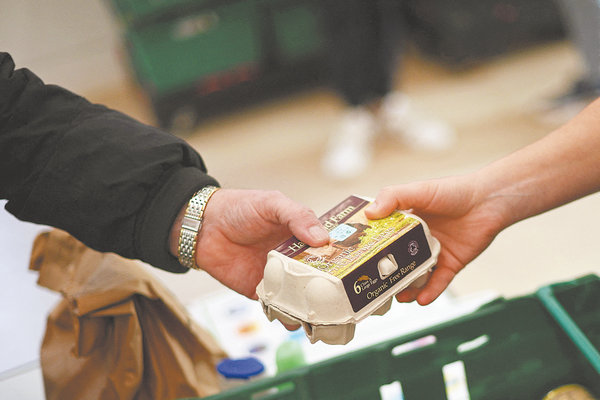UK shortages egged on by several crises


Rising energy costs
Moreover, it is not only the stable production of Christmas poultry and eggs that are at risk, so are fruits and vegetables, but for other causes — labor shortages and rising energy costs.
Scholars have long established the links between energy and food security, and found agricultural food prices rise with any fluctuation in oil prices, and an inflation in the price of oil threatens not only energy security, but food security as well.
Earlier this year, the World Bank said in a report that the increase in energy prices over the past two years has been the largest since the 1973 oil crisis. Price increases for food commodities and fertilizers, which rely on natural gas as a production input, have been the largest since 2008.
In November, Britain faced an inflation increase of 11.1 percent, a 40-year high, a large part of which is contributed to by soaring energy prices.
According to Britain's National Farmers' Union, which represents more than 46,000 farming businesses in the UK, this year, energy-intensive crops, including tomatoes, cucumbers and pears, are on track for their lowest recorded yields since 1985.
It also told the BBC that milk prices were likely to fall below the cost of production, while beef farmers were considering reducing the number of cows they breed. Rising costs were to blame, it said, with fertilizer prices for farmers more than tripling since 2019 and the cost of feed and diesel up by 75 percent.
" (There are) huge issues for pigs, for poultry meat, for eggs, for fresh produce," NFU's president, Minette Batters, told journalists, warning that more agricultural companies have been pushed out of business, as there were currently 7,000 fewer registered agricultural companies in the UK than in 2019.
But, in December, the UK's Secretary of State for Environment, Food and Rural Affairs, Theresa Coffey, ruled out government measures of intervention to help farmers and consumers. The Guardian reported that Coffey acknowledged the growing demand for food banks around the country, and pointed to steps such as the forthcoming increase in benefits and measures to reduce energy bills, but declined to promise any further support.
She said: "It is not the role of the government to provide free food."
Besides the soaring energy costs that drove down food production, getting enough labor into the UK has become a particular issue since Brexit was officially completed in 2020.
Tom Bradshaw, deputy president of NFU, wrote a letter to the UK's immigration minister on Nov 29, expressing the union's concern over visas for next year's seasonal workers.
The current Seasonal Worker Scheme was launched by the Johnson government in March 2019 with an initial quota of 2,500 places per year, and currently stood at 38,000, plus another 2,000 for poultry workers.
The Johnson Government said that the quota would be reduced to 30,000 in 2023 and 28,000 in 2024. By contrast, during the short premiership of Liz Truss, the government increased the quota.
However, there has been no confirmation that an increase will be pursued under the current prime minister, Rishi Sunak, nor has there been an announcement on the future of the scheme beyond 2024.
"The news that the Seasonal Workers Scheme is guaranteed until 2024 was a welcome boost for growers last year. However, we remain concerned that the number of visas available are not sufficient to prevent further crop losses and a continued fall in UK production," Bradshaw said.
According to NFU surveys, more than£22 million worth of fruit and vegetables has been wasted directly due to workforce shortages in the first half of this year, and the NFU said the sector requires 70,000 workers.
"It's nothing short of a travesty that quality, nutritious food is being wasted at a time when families across the country are already struggling to make ends meet because of soaring living costs," said Bradshaw.
"This means increasing the number of visas available to meet the sector's needs and expanding it to a minimum five-year rolling scheme to enable growers to have the confidence to invest in their businesses."
Important factors
However, a report by researchers from University of Oxford and Leeds University, based on the immigration data since 2019, suggested that Brexit is not the only reason for the labor shortage, adding that the pandemic, international sector-specific labor shortages, and an increase in early retirement have been more important factors.
The report co-author, Chris Forde of Leeds University, said: "While there is some evidence that the end of free movement has contributed to shortages in some areas of the UK labor market, it is by no means the only driver. In fact, recruiting difficulties are not unique to the UK and several other countries have experienced high vacancy rates post-pandemic."
The UK is just one of the many countries facing a food supply challenge, which is the fallout of the pandemic, the conflict between Russia and Ukraine, and the more frequent extreme weather due to climate change.
According to the 2023 Global Humanitarian Overview, by the end of this year, more than 222 million people across 53 countries may suffer from acute food insecurity, putting their lives or livelihoods in danger because they do not have enough to eat.
Next year will set another record for humanitarian relief requirements, with 339 million people in need of assistance in 69 countries, an increase of 65 million people compared to the same time last year, the United Nations and partner organizations said on Dec 1.
To tackle the crisis, the UK government has published its Government Food Strategy in June, in which it stated the country is largely self-sufficient in wheat, meats, eggs, and some sectors of vegetable production, and that, for the past 20 years, the UK has produced around 75 percent of what its people consume, which the government is committed to maintaining in the future.
It also noted that, to keep food prices down, barrier-free food trade is required, and it called upon all countries, including those in the World Trade Organization, to keep food trade flowing and avoid trade-restrictive measures.




































